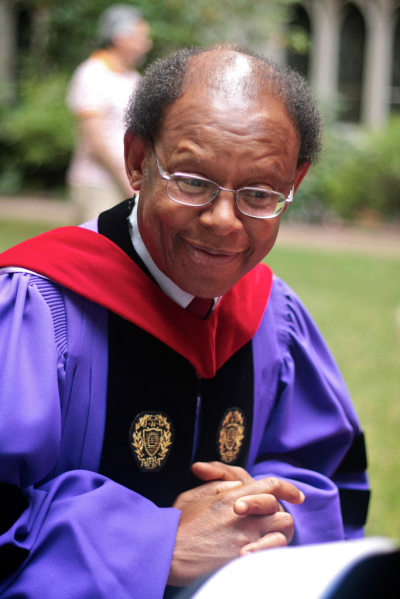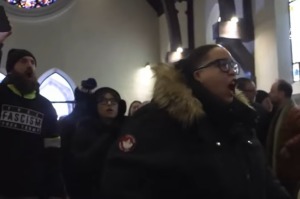James Cone, Racism, Evangelicals and the Wheaton Meeting

I was heart-broken to hear of the passing of Dr. James Cone, a legendary theological professor. Having taken many classes with him at Union Theological Seminary in New York, having taught his work at New York Theological Seminary, Cone's theological vision has permeated my own evangelical theology.
When Dr. Martin Luther King, Jr. was brutally murdered on April 4, 1968, James Cone was mad as hornets. Cone went down into the basement of his brother Cecil's church — Union A.M.E. in Little Rock, Arkansas — and wrote Black Theology and Black Power (1969) in six weeks. Cone writes of this experience, "It seemed as if a transcendent voice were speaking to me through the scriptures and the medium of African American History and culture, reminding me that God's liberation of the poor is the primary theme of Jesus' gospel."
Liberation is the heart and soul of the Gospel. White evangelicals have demonstrated a commitment to thinking carefully about Christ and culture; now is the time to have an honest conversation about race in American society that includes the Evangelical Church, and Cone's life's work and death offer us the opportunity to reflect more deeply and deliberately during difficult days.
Anointed by the Holy Spirit, Jesus inaugurated his ministry proclaiming "Good News to the Poor" (Luke 4:18,19). From the perspective of the poor in ancient Palestine, Jesus' message of justice, freedom and hope was heard as "good news." Connecting Jesus' preaching to the poor with the poverty and oppression of Black people in America, Cone reimagined Christian theology in the context of an America that continued to struggle with racism as its original and ongoing sin. Drawing on the Exodus narrative where God liberated Israel from the Egyptians, Cone discerned God's liberating activity in the Black Freedom movement as he spoke out boldly for every black person in America who was trying to survive in a white supremacist regime.
Cone experienced racism first-hand, growing up in the segregated South down in Bearden, Arkansas in the 1940s and 1950s, and witnessed how Black folks suffered as marginalized people in a white world. In order to testify to the liberating power of the Gospel, Cone sought to interrogate the white supremacy that was preached and taught in white churches, colleges and seminaries. Inspired by Dr. Martin Luther King Jr.'s announcement of a "world freedom revolution", Cone wanted to usher in a theological revolution.
Like Jesus' suffering as a marginalized Jew in a Roman world, Cone's A Black Theology of Liberation (1970) highlighted the realities of black suffering and struggle in the field of Christian theology and ministry. A minister and theologian in the African Methodist Episcopal Church, Cone offered a courageous challenge to pastors and churches to confront America's racist past in order to press on toward a more just and equitable future. Among Cone's students is Rev. Dr. Raphael G. Warnock, Senior Minister of Ebenezer Baptist Church in Atlanta, a pulpit formerly held by Dr. Martin Luther King, Jr., Warnock argues in The Divided Mind of the Black Church: Theology, Piety and Public Witness, that the faith of the black church has been shaped and characterized by two complementary yet competing sensibilities: "revivalist piety and radical protest." Dr. King and the Black Christian leadership of the Civil Rights Movement were able to bring together these two streams in a fierce, faith-rooted movement for justice. Many white evangelicals shared this history of revivalist piety, but they were often resistant to participating in radical protest, and approached the problem of racism through personal piety, focusing on personal compassion. However, being an ethical individual is not enough for a problem like systemic racism that includes personal prejudice and power that has been institutionalized in a white supremacist system.
So while many white evangelical's hearts may be in the right place, they have been tone deaf to the blue note of black suffering played in Cone's theology. Cone's challenge to white evangelicals to confront racism demands more than becoming anti-racist individuals; it challenges us to acknowledge and repent the ways in which we are participating in a system of white supremacy that benefits white people, while harming Black and brown people. The only way to change the white supremacist system is to understand the system and work collectively to dismantle it.
To that end, 50 evangelicals met at Wheaton College last week for a two-day symposium to discuss how evangelicalism could begin to confront its racist past and chart out a path toward a prophetic intercultural future. Chaired by Rev. Claude Alexander, senior pastor of the Park Church in Charlotte, North Carolina, Rev. Gabriel Salguero, president of the National Latino Evangelical Coalition, and Jenny Yang, a vice-president with World Relief, the meeting provided an important space for evangelical leaders to have an honest conversation about public Christian witness, addressing racism, sexism and immigration in the evangelical world. A rift emerged between the young leaders of color and older white leaders like Dr. Ed Stetzer, Executive Director of the Billy Graham Center at Wheaton College, who decided not to return for the second day of the gathering. Instead of walking out, Dr. Cone would exhort white evangelical leaders to stay at the table.
It's vital that we as white evangelical leaders stay at this increasingly diverse evangelical faith table. Only through honest conversation, vulnerable prayer and collective action can we heal racism and work for a better tomorrow. Now is the time for evangelical pastors and theologians to think, speak out, repent and work together. U.S. evangelicalism has been complicit in a rigged system of white supremacy in America whose victims are Black, but also Brown folks, First Nations, Asians, Jews and Muslims. Ultimately white supremacy harms everybody.
As President Trump prepares to meet with over one thousand conservative evangelical leaders in June, a group of courageous evangelicals of color are meeting May 4-5 at the "Voices Conference" in Philadelphia to offer a prophetic alternative. Gatherings of forward-thinking prophetic evangelicalism are happening on the periphery in places like Philadelphia, challenging the center in places like Wheaton, with evangelical leaders like Leroy Barber, Amena Brown, Micah Bourne, Mark Charles, Elizabeth Conde-Frazer, Kathy Khang, Mike McBride, Latasha Morrison, Soong-Chan Ray, Andrea Smith and Gabe Veas who represent the new face of evangelicalism.
Theology is not primarily about interpreting the world, but about constructing a more just and equitable world through bearing prophetic witness to Christ and the Kingdom. Forged in the fires of the Civil Rights and Black Power movements, James Cone's Black Liberation Theology offers a courageous critique of the whiteness of American evangelical theology, a prophetic Christian theology relevant to black existence in a nation dominated by white supremacy. After Cone, evangelical Christians can and should be unapologetically Black and unapologetically Christian.
The beating heart of Christian Theology is Black Liberation. May Dr. James Cone's Black Liberationist vision be resurrected in a new generation of evangelicals committed to racial justice, prophetic integrity, and large-hearted love. James Cone's heart for Liberation Love, lives on in the Jesus-led movement for faith-rooted justice, radical hospitality, and revolutionary love. When white evangelicals stay at the table with Christians of color, a brighter day will dawn in the evangelical world.



























